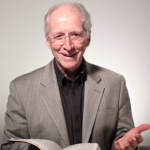 Article: Decision Making & “I Have a Peace About It” by Eric Davis (original source https://thecripplegate.com/we-dont-need-a-peace-about-it/)
Article: Decision Making & “I Have a Peace About It” by Eric Davis (original source https://thecripplegate.com/we-dont-need-a-peace-about-it/)
A professing Christian was in a rough marriage for many years. It came to the point where they felt as if they could not take it anymore. Divorce entered the thoughts. They sought counsel from other Christians. Some opened Scripture, some didn’t, and some prayed. Though no biblical grounds for divorce, it came to the point where they could not see how God would want them to be unhappy in marriage. The marriage did not bring feelings of peace and comfort. So, they went through with the divorce on the grounds that both they and their close Christian friends “had a peace about it.”
Perhaps you’ve said it. “I have a peace about it.” Sometimes it takes on a different form. “I have prayed about it, so it’s God’s will.” Or, “I have a peace about it, so God is calling me to…” Those words are often-assumed gateways to what God wants me to do in the throes of life. But, is my “peace” God’s enthusiastic permission slip for my “it”? Is my prayer and peace heaven’s approval for whatever “it” may be in my life?
That process of making the decision usually goes something like this. I am facing a difficult issue in my life, requiring some wise decision-making. However, I approach the decision with a pre-existing bent towards my own comfort. Instead of an objective approach to the decision, I have a subjective bent towards getting my own way. I have some desire for God to weigh in on the decision. I may pray about it, look up a few verses, and ask a few friends, but I am hoping to discover some Christian key to unlock my wants. I likely run into counsel either from godly friends, leadership, or Scripture which hinders getting my way. I subsequently feel more drawn towards my decision. I find a few verses (which I do not rigorously study with a proper hermeneutic and help from church leadership) that, though taken out of context, seem to support what I already want. This fuels my existing idolatrous pursuit. I run across some friends and verses which assure me that God wants me to feel happy and joyful about what I do. Since it does not seem joyful to make the more difficult decision, I am further established in my own way. I run across some verses which discuss personal peace. I perceive a feeling of personal peace as I meditate on my pre-desired decision and the consequent ease it will bring in my life. Therefore, since I experience feelings of increasing pleasure, I conclude that I am at peace. Thus, since I presume that God wants me to be at peace, I conclude that my feeling of peace is God assuring me, “This is the decision you should make.” Finally, I declare, “I have a peace about making this decision. I have prayed about it. God is calling me to ____.” And I go through with the decision. But all is not well.
Here are a few thoughts to consider before we use our personal peace as determinative of God’s will.
Scripture alone is God’s means of communicating his will for us.
All Scripture is inspired by God and profitable for teaching, for reproof, for correction, for training in righteousness; so that the man of God may be adequate, equipped for every good work” (2 Tim. 3:16-17).
Much of this issue boils down to the sufficiency of Scripture. Is the Bible alone sufficient to guide me in decision-making with matters pertaining to life and godliness? Has God adequately outfitted humanity to know and do his will?
Leaning on feelings of peace, in effect, says, “No.” Though Bible verses may be consulted, what tilts the decision scale is subjective to the individual; what is subjectively comfortable. Thus, to use “I have a peace about it” as the determinative factor says, “Though the sovereign God of the universe has spoken in his word, God has simply failed to provide humanity with what we need for life and godliness.”
And, leaning on feelings of peace and the Bible also may deny the sufficiency of Scripture. Bible verses can be ripped out of context. I can operate with a hermeneutic of happiness: since I should be joyful always, I will make whatever decision helps me to maintain feelings of joy.
Bottom line: the “I-have-a-peace-about-it” method of decision-making denies the sufficiency of Scripture.
Our “peace” could be putting ourselves in the place of God.
Overall, the “I-have-a-peace-about-it” approach to life can be dangerous. I may “have a peace” and “have prayed about” a decision, but if my decision is in contrary to the word of God, then my peace or prayer is likely a self-permitted license of self-sovereignty. I am placing myself in authority over God, while ensuring that others cannot question me because of my supposed “peace” or “prayer.”
I wonder if sometimes we use our “peace about it” as a self-issued cosmic fortune cookie for our idolatrous pursuits. Perhaps our peace is not God’s will at all. Instead, our peace is simply our feelings. So, our feelings become determinative. Thus, our feelings are functionally authoritative. Our feelings are a functional god, which is to say, we have made ourselves god.
3. God does not tell us that an internal peace is his means of communicating his will.
“Your word is a lamp to my feet and a light to my path” (Ps. 119:105).
There is no Bible verse which says, “Ok, the decision which causes you to experience peaceful feelings is the decision you should make.” And God never said, “The way in which I will signal to you what I want you to do in big decisions is by causing you to feel a peace.”
When God communicated to us, it was a revealing, hence the reason Scripture is called “special revelation.” He did so because fallen humanity is in such a damaged condition that we are incapable of determining his will and desirous of self-sovereignty. In his mercy, he spoke in the 66 books of Scripture. We need a lamp for our feet and light for our path because we willfully and naturally are in complete darkness. Thus, God’s will is something that is determined by resources outside of us, not inside; by Scripture, not hunches. Continue reading







